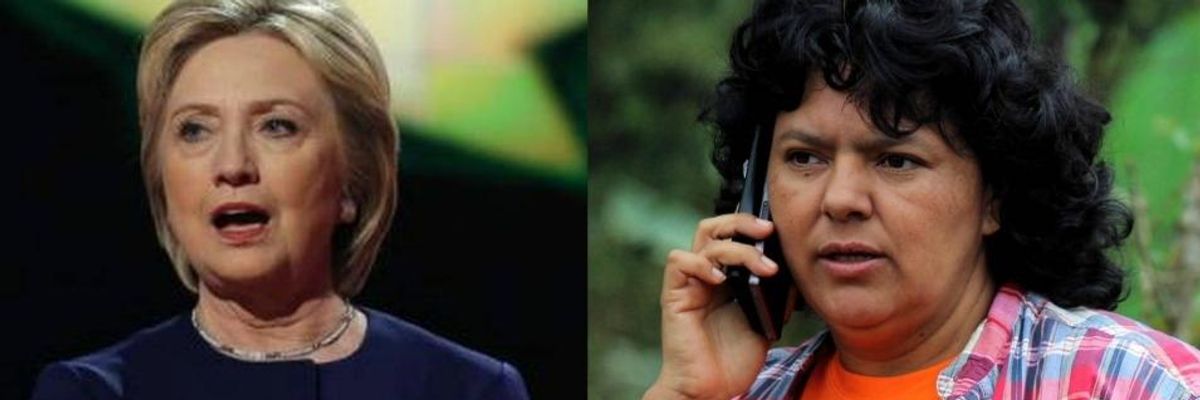As U.S. policy makers equivocate about resolving the crisis of democracy in Honduras, a major issue is being ignored--the widespread abuses of human rights in the aftermath of the Honduran coup.
The brunt of these abuses has been borne by the women of Honduras. So far, the Obama administration has failed to come to their defense even as their efforts to promote peace and democracy in their country have been met with systematic repression.
When democratically elected President Manuel Zelaya was forcibly abducted from his home in the middle of the night on June 28 by military officers and escorted to Costa Rica, Honduran citizens mobilized across the country in a peaceful pro-democracy movement to protest the coup and demand a return to constitutional order.
Women make up the majority of this vast resistance movement, playing a critical leadership role in all aspects of civil disobedience and citizen protection. For their support of democracy, women leaders have received death threats, they have been attacked with nail-studded police batons, tear gas and bullets--and they have been raped and sexually abused. Detained by police or military for hours and even days without charges or access to legal counsel, women have been deprived of medicine, food, and water. At least two cases have resulted in death.
Moreover, a lawless violence against women has pervaded Honduras since the coup. Women's groups in Honduras have documented 249 cases of violations of women's human rights, including 23 cases of beatings and sexual assault and seven gang rapes by police explicitly trying to "punish" women for their involvement in demonstrations. The number of femicides--the violent murder of women because they are women--has tripled since the coup, with 51 cases reported during the month of July alone.
But these statistics do not tell the whole story. Since those responsible for investigating cases are often the perpetrators of these atrocities, it not hard to understand why women are unwilling to come forward to report gender-related crimes against them.
Although the US officially condemned the coup, US policy has been weak and at times contradictory. The recent agreement between the coup government and the constitutional president, brokered by the US government in October, foundered when the Honduran Congress refused to schedule a vote on the reinstatement of President Zelaya-a crucial point of the accord.
Regrettably, the US then appeared to shift its position, saying it would recognize the November 29 elections staged by a coup regime and supported by the armed forces, despite non-compliance with the points of the agreement.
The nationwide movement of women that came together to oppose the coup and protect women's human rights has clearly stated its position: "It is impossible to have free and fair elections in a context of violence and repression, when the perpetrators of the violence - the police and military - are mandated with running the elections."
This fact is abundantly clear to all of Europe and Latin America, the Organization of American States, and many international agencies. They state, unequivocally, that they will not recognize as legitimate an election run by the coup government in the current context.
Within Honduras, the independent presidential candidate and nearly 300 mayors and deputies have withdrawn their candidacies in protest. Increasingly, the US stands alone in offering to endorse elections hastily staged by a military regime instead of continuing to build a lasting and just solution to the political crisis.
We are deeply concerned that this policy is rewarding lawlessness and brutality, and so are many other prominent women. "We urge you to condemn the orchestrated campaign of violence against women being waged by the current de facto regime," two members of the Nobel Women's Initiative and eight other women leaders wrote in recent letter to Secretary of State Hillary Clinton. "Please step forward, as you have done elsewhere, and work to stop the violence now."
The Elections will not be a panacea-particularly when much of the Honduran population and the international community view them as illegitimate. The US needs to live up to the expectations the Obama administration has raised and stand with Honduran women in their fight for democracy and human rights.
Jody Williams and Lisa VeneKlasen co-directed the Nicaragua-Honduras Education Project from 1984-86.
